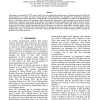Free Online Productivity Tools
i2Speak
i2Symbol
i2OCR
iTex2Img
iWeb2Print
iWeb2Shot
i2Type
iPdf2Split
iPdf2Merge
i2Bopomofo
i2Arabic
i2Style
i2Image
i2PDF
iLatex2Rtf
Sci2ools
105
click to vote
LREC
2010
2010
The D-TUNA Corpus: A Dutch Dataset for the Evaluation of Referring Expression Generation Algorithms
In this paper, we present the D-TUNA corpus, which is the first semantically annotated corpus of referring expressions in Dutch. Its primary function is to evaluate and improve the performance of REG algorithms. Such algorithms are computational models that automatically generate referring expressions by computing how a specific target can be identified to an addressee by distinguishing it from a set of distractor objects. We performed a large-scale production experiment, in which participants were asked to describe furniture items and people, and provided all descriptions with semantic information regarding the target and the distractor objects. Besides being useful for evaluating REG algorithms, the corpus addresses several other research goals. Firstly, the corpus contains both written and spoken referring expressions uttered in the direction of an addressee, which enables systematic analyses of how modality (text or speech) influences the human production of referring expressions....
| Added | 29 Oct 2010 |
| Updated | 29 Oct 2010 |
| Type | Conference |
| Year | 2010 |
| Where | LREC |
| Authors | Ruud Koolen, Emiel Krahmer |
Comments (0)

